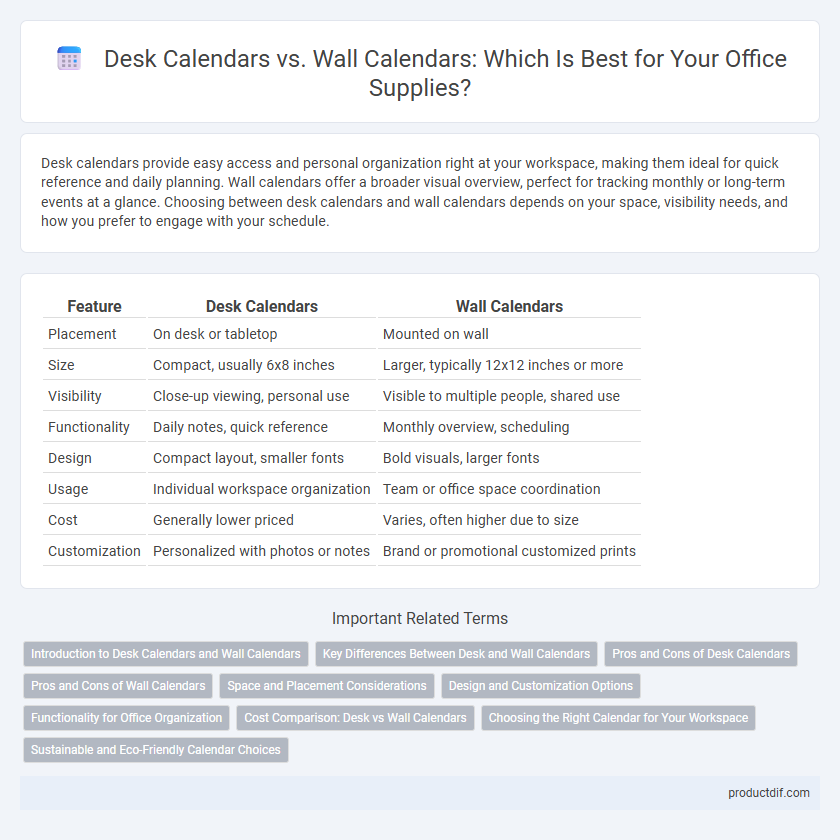Desk calendars provide easy access and personal organization right at your workspace, making them ideal for quick reference and daily planning. Wall calendars offer a broader visual overview, perfect for tracking monthly or long-term events at a glance. Choosing between desk calendars and wall calendars depends on your space, visibility needs, and how you prefer to engage with your schedule.
Table of Comparison
| Feature | Desk Calendars | Wall Calendars |
|---|---|---|
| Placement | On desk or tabletop | Mounted on wall |
| Size | Compact, usually 6x8 inches | Larger, typically 12x12 inches or more |
| Visibility | Close-up viewing, personal use | Visible to multiple people, shared use |
| Functionality | Daily notes, quick reference | Monthly overview, scheduling |
| Design | Compact layout, smaller fonts | Bold visuals, larger fonts |
| Usage | Individual workspace organization | Team or office space coordination |
| Cost | Generally lower priced | Varies, often higher due to size |
| Customization | Personalized with photos or notes | Brand or promotional customized prints |
Introduction to Desk Calendars and Wall Calendars
Desk calendars provide a compact and convenient way to organize daily tasks directly on a workspace, offering easy access to dates and notes without leaving the desk. Wall calendars, in contrast, are larger and designed for visible display, ideal for tracking monthly schedules and communal planning in shared office areas. Both calendar types enhance time management but cater to different spatial and functional needs within office environments.
Key Differences Between Desk and Wall Calendars
Desk calendars offer compact, easily accessible date tracking ideal for personal workspaces, featuring daily or monthly views that fit on desks without occupying wall space. Wall calendars provide larger, visible displays suitable for shared environments, allowing multiple users to view schedules simultaneously, often with monthly spreads emphasizing broad planning. The key differences lie in their size, visibility, and usage context--desk calendars suit individual quick reference, while wall calendars cater to collaborative or family scheduling needs.
Pros and Cons of Desk Calendars
Desk calendars offer easy accessibility and immediate reference, enhancing daily planning efficiency for office tasks. Their compact design saves wall space and allows personalization, but limited visibility can hinder collaborative scheduling in group environments. Desk calendars may also require frequent updates and are prone to being overlooked in busy workspaces compared to wall calendars.
Pros and Cons of Wall Calendars
Wall calendars offer high visibility, making it easy to track appointments and deadlines at a glance, which enhances team collaboration in office environments. They save desk space and serve as decorative elements, but their fixed placement can limit portability and personal accessibility compared to desk calendars. The large display is ideal for group settings, though wall calendars may require frequent updates and lack the convenience of individual customization found in desk versions.
Space and Placement Considerations
Desk calendars provide a compact solution ideal for limited workspace, fitting neatly on desks without occupying wall space. Wall calendars save desktop area by utilizing vertical space, making them suitable for communal areas or when visibility from a distance is necessary. Choosing between desk and wall calendars depends on available space, placement preferences, and the need for easy accessibility or group reference.
Design and Customization Options
Desk calendars offer compact designs with customizable features such as personalized photo inserts, logo placements, and varied layout options, making them ideal for individual use or promotional giveaways. Wall calendars provide larger display areas with extensive customization possibilities, including full-page artwork, branded headers, and multi-language date formats, suitable for office-wide visibility. Both types support unique visual themes and corporate branding to enhance workspace aesthetics and functionality.
Functionality for Office Organization
Desk calendars offer immediate accessibility and space-efficient organization for daily scheduling, supporting quick reference and note-taking during meetings. Wall calendars provide a broader visual overview of monthly or yearly plans, enhancing team coordination and deadline tracking across shared office spaces. Choosing between them depends on whether individual task management or collective scheduling visibility is the primary organizational goal.
Cost Comparison: Desk vs Wall Calendars
Desk calendars generally cost more per unit due to their compact design, premium materials, and integrated features like pen holders or notes space, making them ideal for personal use in office settings. Wall calendars offer a more economical option, especially in bulk, as they are larger, simpler in construction, and designed for communal visibility rather than individual convenience. Businesses looking to minimize expenses typically choose wall calendars for shared spaces, while desk calendars are preferred for personalized organization despite the higher price.
Choosing the Right Calendar for Your Workspace
Desk calendars offer easy accessibility and frequent visibility, making them ideal for personal task management and quick reference during work. Wall calendars provide a large, visible overview suited for team coordination and long-term planning in shared office spaces. Selecting the right calendar depends on workspace size, team collaboration needs, and individual versus group usage.
Sustainable and Eco-Friendly Calendar Choices
Desk calendars often use recycled paper and soy-based inks, making them a sustainable choice for eco-conscious offices, while wall calendars with biodegradable materials reduce landfill waste and promote greener practices. Both designs offer eco-friendly printing options from certified sustainable forests, ensuring minimal environmental impact. Selecting calendars with refillable or reusable components further enhances office sustainability efforts.
Desk Calendars vs Wall Calendars Infographic

 productdif.com
productdif.com